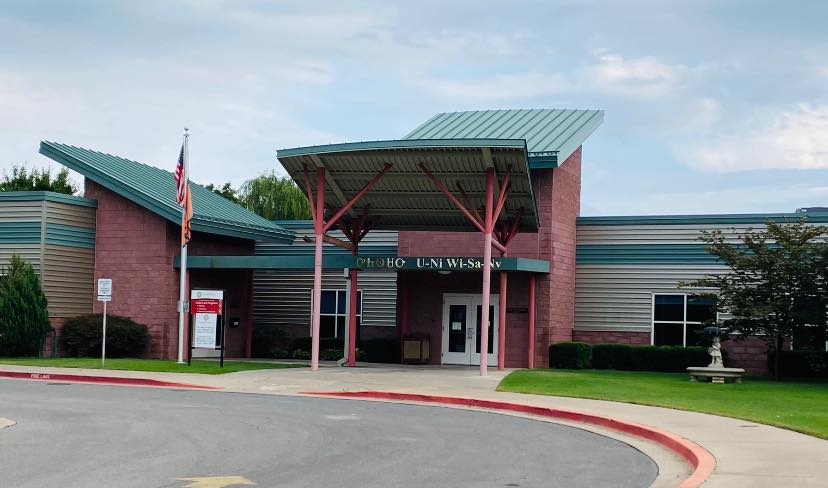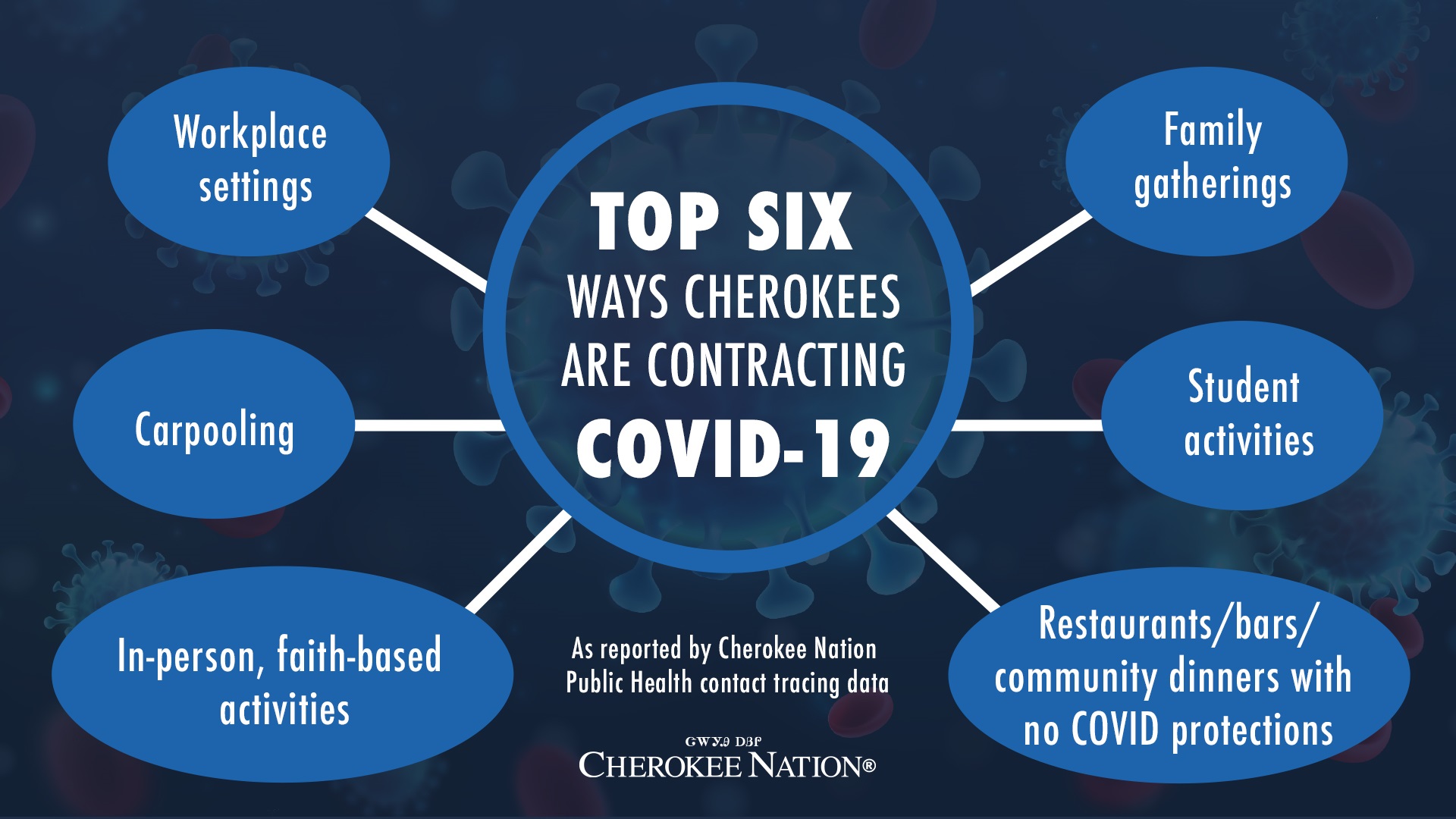
- Details
- By Levi Rickert
TAHLEQUAH, Okla. — The Cherokee Nation sounded the alarm on Monday citing a 200 percent increase of COVID-19 cases in a 30-day period. Positive cases climbed from 219 to 684 between June 27 and July 27.
The Cherokee Nation Public Health team says the significant increase can be attributed to gatherings where social distancing measures and proper mask usage have not been observed.
Data collected by CNPH shows that Cherokee citizens who fail to follow proper social distancing guidance and who are not wearing masks are coming into contact with COVID-19 in specific locations. These include faith-based activities; family gatherings including birthday parties, weddings and funerals; restaurants, bars and community dinners; student activities such as sporting events, proms and graduations; car-pooling; and workplace settings.

“As the number of positive cases quickly rises in the Cherokee Nation, we need to be more prepared than ever to make tough decisions and avoid specific activities whenever possible until the risk of community spread has diminished,” Cherokee Nation Principal Chief Chuck Hoskin Jr. said.
Health experts say proper safety measures include wearing a mask, being in the presence of others for no longer than 15 minutes while maintaining a distance of at least six feet, and frequently washing hands.
“This is especially difficult for Cherokees because fellowship and family are so ingrained in our culture. Following guidelines and recommendations from our health care and scientific experts is absolutely critical to keeping us safe and healthy, including our Cherokee elders and speakers who are often among the most vulnerable to this deadly virus. Now more than ever I ask you as fellow Cherokees to help us stop the spread of this virus throughout our communities. Please, wear a mask and keep a safe social distance if you must be around other people, and wash your hands as often as possible. These simple tasks may save your life and the lives of your fellow Cherokees,” Hoskin added.
Knowing the risks associated with a particular gathering or event, and choosing only to visit those that are practicing proper safety protections, can help to prevent exposure to COVID-19 in Cherokee communities.
“Before participating in any gathering, ask yourself these simple questions to evaluate the risk of being exposed, or exposing someone else, to COVID-19: Do I have symptoms? Do I really need to go out or travel? Who are the people I will be around? Is my destination spacious and well-ventilated? Does my destination practice screening, hygiene, mask-wearing and social distancing? When it comes to COVID-19, it’s best to be wise and to assess your risks rather than to be unconcerned,” Lisa Pivec, senior director of CNPH said.
Last week, the Cherokee Nation Child Development Center in Tahlequah, Okla. was closed after an employee tested positive for COVID-19. The Housing Authority of the Cherokee Nation also temporarily closed its Stilwell, Okla. office after an employee there tested positive for COVID-19.
As a result, the tribe is using enhanced sanitization practices in both facilities before they are allowed to reopen.
On an ongoing basis during the pandemic, the Cherokee Nation requires all employees and guests to the tribe’s 150 government offices throughout the reservation to wear masks and follow social distancing protocols. The tribe is also utilizing temperature screenings of employees and guests at governmental facilities.
The Cherokee Nation has a COVID-19 Call Center at 1-833-528-0063 and an epidemiology line at 539-234-4030 for more information.The Cherokee Nation has also approved its Respond, Rebuild and Recover COVID-19 relief spending plan to help citizens with emergencies, work programs, student technology, elder utilities, emergency food and more. More information on these relief programs is available at www.cherokee.org and on the tribe’s social media channels, including its Facebook page.
More Stories Like This
Native News Weekly (August 25, 2024): D.C. BriefsNative News Weekly (March 1, 2026): D.C. Briefs
Scope Narrowed, Report Withheld: Questions Mount Over Michigan Boarding School Study
Zuni Youth Enrichment Project Announces Family Engagement Night and Spring Break Youth Programming
Next on Native Bidaské: Leonard Peltier Reflects on His First Year After Prison
Help us defend tribal sovereignty.
At Native News Online, our mission is rooted in telling the stories that strengthen sovereignty and uplift Indigenous voices — not just at year’s end, but every single day.
Because of your generosity last year, we were able to keep our reporters on the ground in tribal communities, at national gatherings and in the halls of Congress — covering the issues that matter most to Indian Country: sovereignty, culture, education, health and economic opportunity.
That support sustained us through a tough year in 2025. Now, as we look to the year ahead, we need your help right now to ensure warrior journalism remains strong — reporting that defends tribal sovereignty, amplifies Native truth, and holds power accountable.
 The stakes couldn't be higher. Your support keeps Native voices heard, Native stories told and Native sovereignty defended.
The stakes couldn't be higher. Your support keeps Native voices heard, Native stories told and Native sovereignty defended.
Stand with Warrior Journalism today.
Levi Rickert (Potawatomi), Editor & Publisher

